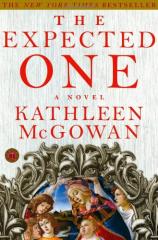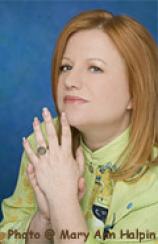The Expected One
Review
The Expected One
Imagine spending 20 years and a significant portion of your
resources researching a compelling and controversial subject, only
to have some upstart come along and turn his research on the same
subject into the bestselling novel of all time. That would have
stopped a lesser soul in its tracks, but journalist Kathleen
McGowan soldiered on and self-published THE EXPECTED ONE, knowing
her book would not be spared the inevitable comparison with THE DA
VINCI CODE. Both novels deal with cultural and oral traditions
surrounding the romantic relationship, possible marriage, and
unbroken bloodline of Jesus and Mary Magdalene. But while Dan
Brown's book was becoming a worldwide blockbuster, McGowan's was
languishing --- until it was released this summer to a wider
audience after it was picked up by Touchstone, an imprint of Simon
& Schuster.
Still, that did not guarantee commercial success. What did draw
attention to the book was the author's unflinching belief that she
is among the innumerable descendents of Mary Magdalene, which she
discovered in the course of her research. Add to that the accounts
of her extraordinary visions of Mary Magdalene, and it's not hard
to understand why McGowan became the celebrity du jour over the
summer. Skeptics scorned and ridiculed her in part for what they
termed inept scholarship, while Magdalene believers embraced and
thanked her for rescuing Mary Magdalene from centuries of
misunderstanding --- and for showing that Jesus could have been
married and a father without abandoning his role as the Son of
God.
That's the backstory. But what about the book itself --- its merits
as a novel, the quality of the writing, its standing as a
page-turner? How does it hold up? Frankly, it doesn't. Before I
tell you why I say that, let me issue an important disclaimer: I
didn't judge the book by McGowan's scholarship, supernatural
experiences, or bloodline claims. None of that mattered to me as I
was reading the book --- which, I might add, I really wanted to
like.
The primary problem is one that most subsequent problems hinge on:
the story is largely autobiographical. McGowan's lead character is
one Maureen Paschal, whose research into maligned women in history
has narrowed down to one woman in particular, Mary Magdalene. Her
research takes her to Jerusalem, Europe and McLean, Virginia, all
hotbeds of Magdalene fervor, and she discovers she is a descendant
of Mary. Maureen (who, we are constantly reminded, is a cute,
petite redhead) is in essence Kathleen.
The personal nature of the book immediately poses a problem for
McGowan the journalist --- as early as chapter one, in which
Maureen visits the Holy Land. There, she has one experience after
another in which she is identified with Mary Magdalene. As I was
reading, I wondered why on earth McGowan gave away so much so soon.
Plus, the writing was little more than narration in this very early
section; it read like a travelogue with a bit of conversation
thrown in. Turns out, that's what it was. I later learned that
McGowan wrote the Jerusalem section exactly the way the events
happened to her. As a journalist she must have found it difficult
to fictionalize her reality. But novels require just that; truth
can be stranger than fiction, and turning reality into fiction
means a writer has to veer from strict adherence to the facts. In
this case, true-to-life scenarios ("Maureen did this, and then she
did that...") surface far too often and end up hurting rather than
enhancing the story.
Then there's the matter of unfortunate timing. I couldn't help but
think that the story would have been better told had it taken place
20 or 30 years ago rather than now. Most of the action takes place
from 2004 to 2005, and during that time Maureen, the seasoned
researcher, is astonished to discover things about Mary Magdalene
that the rest of the reading world knew by then. (At one point, I
found myself wondering, "Didn't Maureen read --- dare I suggest it
--- THE DA VINCI CODE?") In short, THE EXPECTED ONE feels outdated,
and at times Maureen comes across as clueless. Thought it's not
explicitly stated, she seems unaware that her last name --- Paschal
--- is linked to Passover and Easter. Nor does she get the
connection between the name of her friend, Tamara Wisdom (is that
contrived or what?), and Jesus and Mary's alleged daughter, Tamar,
until the end of the book. Tamara, by the way, is the most
interesting contemporary character, while Jesus and Mary Magdalene
are rightfully the most compelling historical figures. The
supposedly charming Lord Bérenger Sinclair, Maureen's host in
France, became increasingly annoying with each supercilious "My
dear" that he uttered. Other characters came across as
lifeless.
McGowan's fiction writing is at its best when she is recounting
first-century events through the eyes of Mary Magdalene. But her
best writing overall comes at the very end, in the nonfiction
afterword. There, she demonstrates where her writing talent truly
lies --- as a journalist.
Reviewed by Marcia Ford. You may contact Marcia by email (misfit@marciaford.com) or through her website (www.marciaford.com). on January 21, 2011
The Expected One
- Publication Date: April 3, 2007
- Genres: Fiction
- Paperback: 480 pages
- Publisher: Touchstone
- ISBN-10: 1416531696
- ISBN-13: 9781416531692





